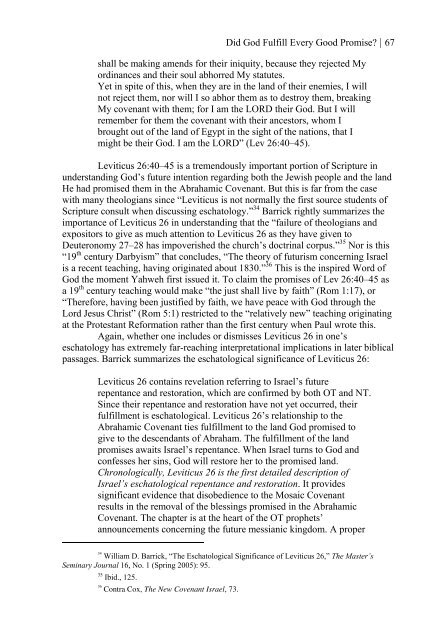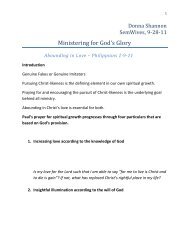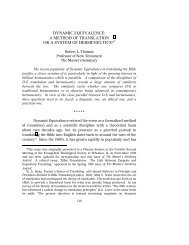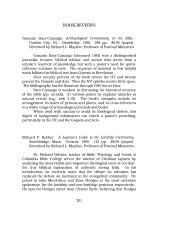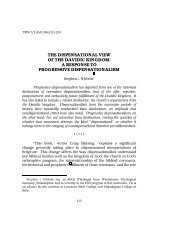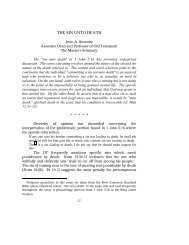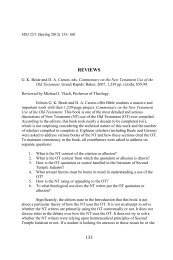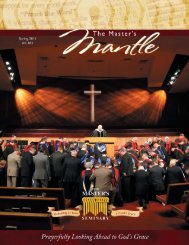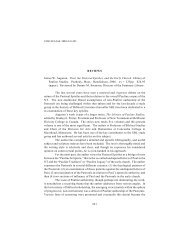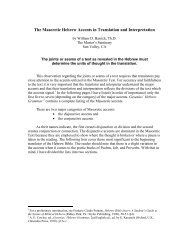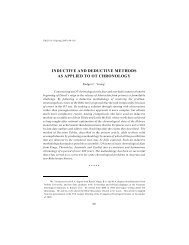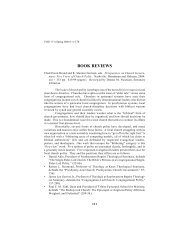Did God Fulfill Every Good Promise? - The Master's Seminary
Did God Fulfill Every Good Promise? - The Master's Seminary
Did God Fulfill Every Good Promise? - The Master's Seminary
You also want an ePaper? Increase the reach of your titles
YUMPU automatically turns print PDFs into web optimized ePapers that Google loves.
<strong>Did</strong> <strong>God</strong> <strong>Fulfill</strong> <strong>Every</strong> <strong>Good</strong> <strong>Promise</strong>? | 67shall be making amends for their iniquity, because they rejected Myordinances and their soul abhorred My statutes.Yet in spite of this, when they are in the land of their enemies, I willnot reject them, nor will I so abhor them as to destroy them, breakingMy covenant with them; for I am the LORD their <strong>God</strong>. But I willremember for them the covenant with their ancestors, whom Ibrought out of the land of Egypt in the sight of the nations, that Imight be their <strong>God</strong>. I am the LORD” (Lev 26:40–45).Leviticus 26:40–45 is a tremendously important portion of Scripture inunderstanding <strong>God</strong>’s future intention regarding both the Jewish people and the landHe had promised them in the Abrahamic Covenant. But this is far from the casewith many theologians since “Leviticus is not normally the first source students ofScripture consult when discussing eschatology.” 34 Barrick rightly summarizes theimportance of Leviticus 26 in understanding that the “failure of theologians andexpositors to give as much attention to Leviticus 26 as they have given toDeuteronomy 27–28 has impoverished the church’s doctrinal corpus.” 35 Nor is this“19 th century Darbyism” that concludes, “<strong>The</strong> theory of futurism concerning Israelis a recent teaching, having originated about 1830.” 36 This is the inspired Word of<strong>God</strong> the moment Yahweh first issued it. To claim the promises of Lev 26:40–45 asa 19 th century teaching would make “the just shall live by faith” (Rom 1:17), or“<strong>The</strong>refore, having been justified by faith, we have peace with <strong>God</strong> through theLord Jesus Christ” (Rom 5:1) restricted to the “relatively new” teaching originatingat the Protestant Reformation rather than the first century when Paul wrote this.Again, whether one includes or dismisses Leviticus 26 in one’seschatology has extremely far-reaching interpretational implications in later biblicalpassages. Barrick summarizes the eschatological significance of Leviticus 26:Leviticus 26 contains revelation referring to Israel’s futurerepentance and restoration, which are confirmed by both OT and NT.Since their repentance and restoration have not yet occurred, theirfulfillment is eschatological. Leviticus 26’s relationship to theAbrahamic Covenant ties fulfillment to the land <strong>God</strong> promised togive to the descendants of Abraham. <strong>The</strong> fulfillment of the landpromises awaits Israel’s repentance. When Israel turns to <strong>God</strong> andconfesses her sins, <strong>God</strong> will restore her to the promised land.Chronologically, Leviticus 26 is the first detailed description ofIsrael’s eschatological repentance and restoration. It providessignificant evidence that disobedience to the Mosaic Covenantresults in the removal of the blessings promised in the AbrahamicCovenant. <strong>The</strong> chapter is at the heart of the OT prophets’announcements concerning the future messianic kingdom. A proper34William D. Barrick, “<strong>The</strong> Eschatological Significance of Leviticus 26,” <strong>The</strong> Master’s<strong>Seminary</strong> Journal 16, No. 1 (Spring 2005): 95.35 Ibid., 125.36Contra Cox, <strong>The</strong> New Covenant Israel, 73.


